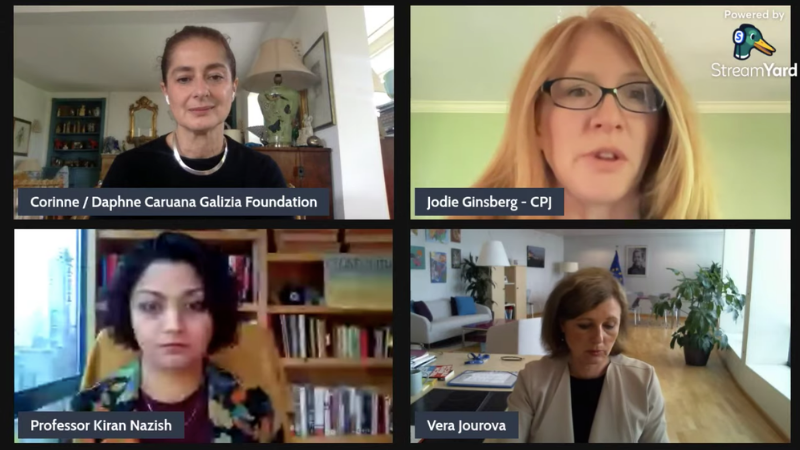The murder of journalists is avoidable, Vera Jourova, the Vice President of the EU Commission and Commissioner for Values and Transparency said on Tuesday, while highlighting prior instances where violence could have been mitigated by the state.
Speaking at an online conference titled ‘Press Freedom and Gender’ focused on the global media landscape in relation to women journalists, Jourova listed a number of threats that journalists in the European Union face, which have also pre-empted the murder of journalists.
“Jan Kuciak had reported threats to the police and they hadn’t done anything,” said Jourova as an example, referring to the murder of Slovakian journalist Jan Kuciak in 2018.
Committee to Protect Journalists President Jodie Ginsberg, who was present on the panel, echoed Jourova’s words. “Often, there is a whole list of things that lead up to that point that make killing avoidable,” she said. Ginsberg referred to the dehumanisation and delegitimisation of journalists as two of the factors which often lead up to violence against journalists.
“Once you remove legitimacy from the journalist you open up the space for them to be attacked verbally and physically,” she said.
Ginsberg also highlighted isolation as one of the factors that make journalists, especially female journalists, a target for threats. “What helps bullies succeed is when someone is operating alone,” she stressed.
Thank you @CFWIJ for the opportunity to discuss the future of press freedom.
Our first priorities are to make journalists safer and protect them from abusive litigation. The particular risks faced by women journalists must be addressed. Next, we will propose #MediaFreedomAct.👇 https://t.co/FNQb13FZP0 pic.twitter.com/RlPqdWRNeC— Věra Jourová (@VeraJourova) May 10, 2022
The Shift News had presented evidence on the dehumanisation of assassinated journalist Daphne Caruana Galizia to the Public Inquiry board tasked with investigating whether the assassination could have been avoided.
Referring to the Public Inquiry findings, Corinne Vella from the Daphne Caruana Galizia Foundation also argued that it was a combination of factors that lead up to her sister’s assassination. “One of those factors was that people in power were using their power to silence her in the court of law,” she said, referring to SLAPP lawsuits.
“Governments have an obligation to create an environment where journalists can do their job safely,” she said, adding that enforcement to end SLAPPS will contribute majorly to creating a safer environment for journalists.
In order to counter such treatment, Ginsberg emphasised the need for the journalistic and political community to show support, and political leaders to use the right rhetoric in support of journalists. Pointing to SLAPP lawsuits, she said that such lawsuits are “deliberately intended to exhaust you so you stop reporting”.
Speaking about her sister’s experience with such litigation, Vella reiterated that the intentions of such lawsuits do indeed “succeed to a tragic extent.” She explained how the little recognition surrounding SLAPP lawsuits was partly because of their “silent” nature. At the time of Caruana Galizia’s murder, there were 47 active court cases against her, five of which were criminal cases.
“Journalists and activists are warned to not speak about the threat they’ve received, so it only comes to light once they are sued,” Vella noted.
Referring to the EU’s anti-SLAPP proposals, which are informally called ‘Daphne’s Law’ after Caruana Galizia, Jourova explained that her intention with such a law is for “judges to stop the case as soon as possible”.
Jourova revealed that she still needs to “convince several justice ministers” about implementing the proposals.
“(Ministers) have said that they need to make sure their citizens have free access to the court. My answer to that is yes, but here has to be a well-founded and justified case, and evidence, and not just because a journalist wrote something about you,” she said.












